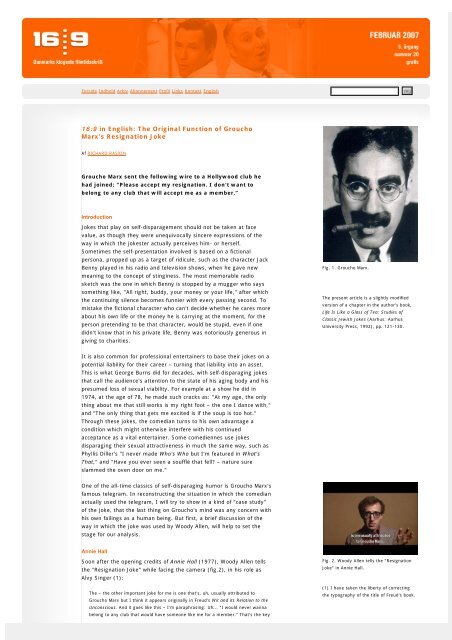Create successful ePaper yourself
Turn your PDF publications into a flip-book with our unique Google optimized e-Paper software.
Forside Indhold Arkiv Abonnement Profil Links Kontakt English<br />
<strong>16</strong>:9 in English: The Original Function of Groucho<br />
Marx's Resignation Joke<br />
Af RICHARD RASKIN<br />
Groucho Marx sent the following wire to a Hollywood club he<br />
had joined: "Please accept my resignation. I don't want to<br />
belong to any club that will accept me as a member.”<br />
Introduction<br />
Jokes that play on self-disparagement should not be taken at face<br />
value, as though they were unequivocally sincere expressions of the<br />
way in which the jokester actually perceives him- or herself.<br />
Sometimes the self-presentation involved is based on a fictional<br />
persona, propped up as a target of ridicule, such as the character Jack<br />
Benny played in his radio and television shows, when he gave new<br />
meaning to the concept of stinginess. The most memorable radio<br />
sketch was the one in which Benny is stopped by a mugger who says<br />
<strong>som</strong>ething like, "All right, buddy, your money or your life," after which<br />
the continuing silence becomes funnier with every passing second. To<br />
mistake the fictional character who can't decide whether he cares more<br />
about his own life or the money he is carrying at the moment, for the<br />
person pretending to be that character, would be stupid, even if one<br />
didn't know that in his private life, Benny was notoriously generous in<br />
giving to charities.<br />
It is also common for professional entertainers to base their jokes on a<br />
potential liability for their career – turning that liability into an asset.<br />
This is what George Burns did for decades, with self-disparaging jokes<br />
that call the audience's attention to the state of his aging body and his<br />
presumed loss of sexual viability. For example at a show he did in<br />
1974, at the age of 78, he made such cracks as: "At my age, the only<br />
thing about me that still works is my right foot – the one I dance with,"<br />
and "The only thing that gets me excited is if the soup is too hot."<br />
Through these jokes, the comedian turns to his own advantage a<br />
condition which might otherwise interfere with his continued<br />
acceptance as a vital entertainer. Some comediennes use jokes<br />
disparaging their sexual attractiveness in much the same way, such as<br />
Phyllis Diller's "I never made Who's Who but I'm featured in What's<br />
That," and "Have you ever seen a soufflé that fell? – nature sure<br />
slammed the oven door on me."<br />
One of the all-time classics of self-disparaging humor is Groucho Marx's<br />
famous telegram. In reconstructing the situation in which the comedian<br />
actually used the telegram, I will try to show in a kind of "case study"<br />
of the joke, that the last thing on Groucho's mind was any concern with<br />
his own failings as a human being. But first, a brief discussion of the<br />
way in which the joke was used by Woody Allen, will help to set the<br />
stage for our analysis.<br />
Annie Hall<br />
Soon after the opening credits of Annie Hall (1977), Woody Allen tells<br />
the "Resignation Joke" while facing the camera (fig.2), in his role as<br />
Alvy Singer (1):<br />
The – the other important joke for me is one that's, uh, usually attributed to<br />
Groucho Marx but I think it appears originally in Freud's Wit and its Relation to the<br />
Unconscious. And it goes like this – I'm paraphrasing: Uh... "I would never wanna<br />
belong to any club that would have <strong>som</strong>eone like me for a member." That's the key<br />
Fig. 1. Groucho Marx.<br />
The present article is a slightly modified<br />
version of a chapter in the author’s book,<br />
Life Is Like a Glass of Tea: Studies of<br />
Classic Jewish Jokes (Aarhus: Aarhus<br />
University Press, 1992), pp. 121-130.<br />
Fig. 2. Woody Allen tells the “Resignation<br />
Joke” in Annie Hall.<br />
(1) I have taken the liberty of correcting<br />
the typography of the title of Freud's book.
















